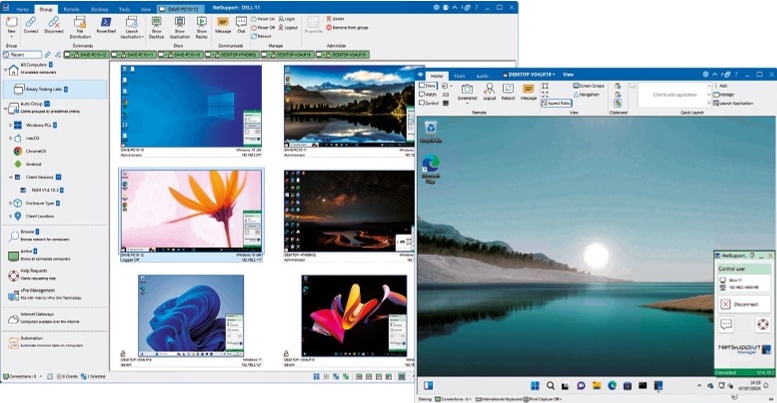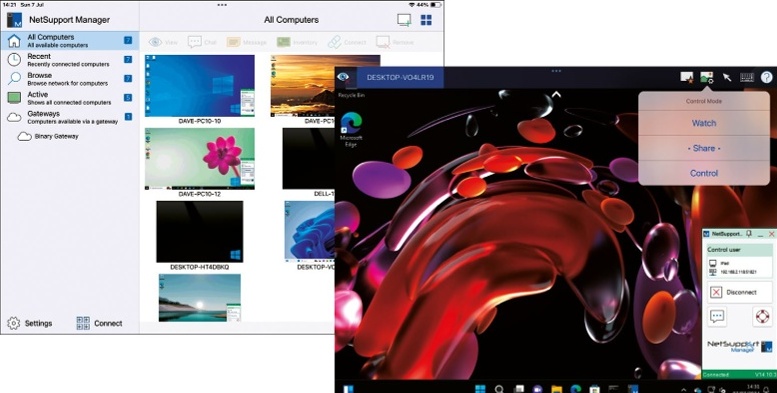Why you can trust TechRadar
This review first appeared in issue 361 of PC Pro.
SMBs that want to keep all their remote desktop support services on–premises need look no further than NetSupport Manager (NSM), which is one of the best solutions on the market. Cost control is another compelling argument since, unlike cloud-hosted services that incur regular monthly fees, NSM is priced on the number of systems you want to support and its perpetual licensing plans mean you pay only once. Now well into its third decade, NSM benefits from constant development with version 14.1 delivering new features and security enhancements.
NSM delivers a wealth of support tools, including remote control, view and screen sharing, file transfer, text or two-way audio chat and recording facilities, remote application launch and Registry editing tools, plus a highly detailed hardware and software inventory.
Out of the box, NSM defaults to requiring a client’s permission for a support session, and technicians now have the ability to blank the remote screen while viewing it. Value gets a boost, too, with NSM including a full copy of the latest NetSupport School classroom management and training solution, which can be deployed alongside NSM using a custom setup.
Installation is swift. We loaded the NSM Control component on a Windows 11 host in around one minute and used its Deploy tool to scan our entire local network and push the client to all our Windows 10/11 client machines. NetSupport has malware activity covered during this phase, as it will prevent the client executable from running if its name has been changed.
Cloud-hosted solutions lend themselves well to supporting staff in remote offices, but NSM has this covered as well as its Gateway and Connectivity Server components are included in the price. Installed at a remote site, these lightweight services are highly secure: they enforce 256-bit AES session encryption, use a unique key that the client must possess in order to connect to the Gateway, and you can decide which technicians are allowed to access them.

The Control console is easy to use, with its left tree menu placing clients in various categories and custom groups for swift access. Auto groups are a smart feature, with NSM dynamically sorting clients based on attributes such as their installed OS, NSM client version, enclosure type (including virtual machines) and geographical location.
NSM’s monitor mode is a feature you won’t find in most cloud-hosted products. This displays scalable thumbnails of the clients’ screens so you can watch user activity in real-time. Users needn’t worry about being spied on as when a technician connects, their local NSM app alerts them and they can disconnect at any time.
A remote control session is started by double-clicking on a client icon and this presents a new window with a wealth of support tools in its upper menu. Along with choosing to control, share or passively view their screen, technicians can launch local apps, have text and audio chats, take screen captures, share clipboards, reboot the client, show their Control screen to single or multiple clients and make training recordings and replay them to clients.
Hardware and software inventory includes all apps and hot fixes, with the Task Manager tool providing a list of processes and services that can be remotely stopped, started or paused. NSM’s file distribution tool is another great time saver as it allows technicians to select local files and send them to multiple clients in one go.
NetSupport Manager sets the standard for on-premises hosted support for both local and remote workers. It delivers a remarkable range of support features and its one-time cost per seat will appeal to businesses concerned about ongoing subscription fees.
Tim Danton is editor-in-chief of PC Pro, the UK's biggest selling IT monthly magazine. He specialises in reviews of laptops, desktop PCs and monitors, and is also author of a book called The Computers That Made Britain.
You can contact Tim directly at editor@pcpro.co.uk.
What is a hands on review?
Hands on reviews' are a journalist's first impressions of a piece of kit based on spending some time with it. It may be just a few moments, or a few hours. The important thing is we have been able to play with it ourselves and can give you some sense of what it's like to use, even if it's only an embryonic view. For more information, see TechRadar's Reviews Guarantee.

